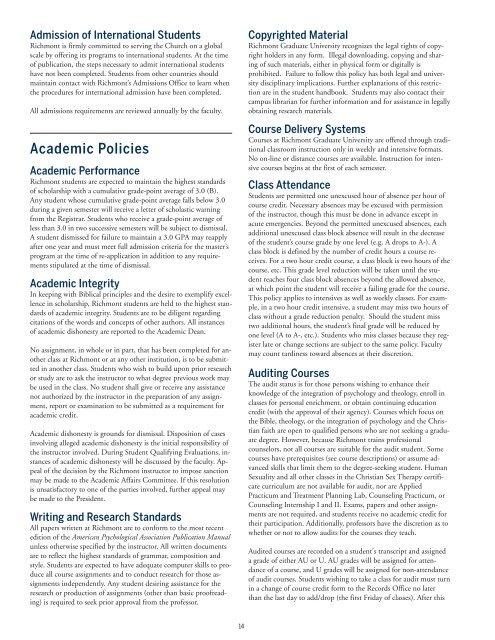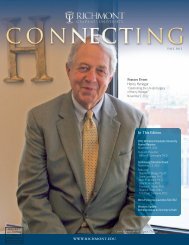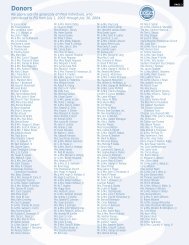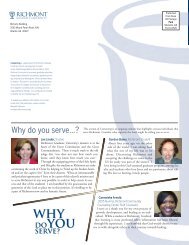Graduate Catalog 2010-2012 - Richmont Graduate University
Graduate Catalog 2010-2012 - Richmont Graduate University
Graduate Catalog 2010-2012 - Richmont Graduate University
You also want an ePaper? Increase the reach of your titles
YUMPU automatically turns print PDFs into web optimized ePapers that Google loves.
Admission of International Students<br />
<strong>Richmont</strong> is firmly committed to serving the Church on a global<br />
scale by offering its programs to international students. At the time<br />
of publication, the steps necessary to admit international students<br />
have not been completed. Students from other countries should<br />
maintain contact with <strong>Richmont</strong>’s Admissions Office to learn when<br />
the procedures for international admission have been completed.<br />
All admissions requirements are reviewed annually by the faculty.<br />
Academic Policies<br />
Academic Performance<br />
<strong>Richmont</strong> students are expected to maintain the highest standards<br />
of scholarship with a cumulative grade-point average of 3.0 (B).<br />
Any student whose cumulative grade-point average falls below 3.0<br />
during a given semester will receive a letter of scholastic warning<br />
from the Registrar. Students who receive a grade-point average of<br />
less than 3.0 in two successive semesters will be subject to dismissal.<br />
A student dismissed for failure to maintain a 3.0 GPA may reapply<br />
after one year and must meet full admission criteria for the master’s<br />
program at the time of re-application in addition to any requirements<br />
stipulated at the time of dismissal.<br />
Academic Integrity<br />
In keeping with Biblical principles and the desire to exemplify excellence<br />
in scholarship, <strong>Richmont</strong> students are held to the highest standards<br />
of academic integrity. Students are to be diligent regarding<br />
citations of the words and concepts of other authors. All instances<br />
of academic dishonesty are reported to the Academic Dean.<br />
No assignment, in whole or in part, that has been completed for another<br />
class at <strong>Richmont</strong> or at any other institution, is to be submitted<br />
in another class. Students who wish to build upon prior research<br />
or study are to ask the instructor to what degree previous work may<br />
be used in the class. No student shall give or receive any assistance<br />
not authorized by the instructor in the preparation of any assignment,<br />
report or examination to be submitted as a requirement for<br />
academic credit.<br />
Academic dishonesty is grounds for dismissal. Disposition of cases<br />
involving alleged academic dishonesty is the initial responsibility of<br />
the instructor involved. During Student Qualifying Evaluations, instances<br />
of academic dishonesty will be discussed by the faculty. Appeal<br />
of the decision by the <strong>Richmont</strong> instructor to impose sanction<br />
may be made to the Academic Affairs Committee. If this resolution<br />
is unsatisfactory to one of the parties involved, further appeal may<br />
be made to the President.<br />
Writing and Research Standards<br />
All papers written at <strong>Richmont</strong> are to conform to the most recent<br />
edition of the American Psychological Association Publication Manual<br />
unless otherwise specified by the instructor. All written documents<br />
are to reflect the highest standards of grammar, composition and<br />
style. Students are expected to have adequate computer skills to produce<br />
all course assignments and to conduct research for those assignments<br />
independently. Any student desiring assistance for the<br />
research or production of assignments (other than basic proofreading)<br />
is required to seek prior approval from the professor.<br />
Copyrighted Material<br />
<strong>Richmont</strong> <strong>Graduate</strong> <strong>University</strong> recognizes the legal rights of copyright<br />
holders in any form. Illegal downloading, copying and sharing<br />
of such materials, either in physical form or digitally is<br />
prohibited. Failure to follow this policy has both legal and university<br />
disciplinary implications. Further explanations of this restriction<br />
are in the student handbook. Students may also contact their<br />
campus librarian for further information and for assistance in legally<br />
obtaining research materials.<br />
Course Delivery Systems<br />
Courses at <strong>Richmont</strong> <strong>Graduate</strong> <strong>University</strong> are offered through traditional<br />
classroom instruction only in weekly and intensive formats.<br />
No on-line or distance courses are available. Instruction for intensive<br />
courses begins at the first of each semester.<br />
Class Attendance<br />
Students are permitted one unexcused hour of absence per hour of<br />
course credit. Necessary absences may be excused with permission<br />
of the instructor, though this must be done in advance except in<br />
acute emergencies. Beyond the permitted unexcused absences, each<br />
additional unexcused class block absence will result in the decrease<br />
of the student’s course grade by one level (e.g. A drops to A-). A<br />
class block is defined by the number of credit hours a course receives.<br />
For a two hour credit course, a class block is two hours of the<br />
course, etc. This grade level reduction will be taken until the student<br />
reaches four class block absences beyond the allowed absence,<br />
at which point the student will receive a failing grade for the course.<br />
This policy applies to intensives as well as weekly classes. For example,<br />
in a two hour credit intensive, a student may miss two hours of<br />
class without a grade reduction penalty. Should the student miss<br />
two additional hours, the student’s final grade will be reduced by<br />
one level (A to A-, etc.). Students who miss classes because they register<br />
late or change sections are subject to the same policy. Faculty<br />
may count tardiness toward absences at their discretion.<br />
Auditing Courses<br />
The audit status is for those persons wishing to enhance their<br />
knowledge of the integration of psychology and theology, enroll in<br />
classes for personal enrichment, or obtain continuing education<br />
credit (with the approval of their agency). Courses which focus on<br />
the Bible, theology, or the integration of psychology and the Christian<br />
faith are open to qualified persons who are not seeking a graduate<br />
degree. However, because <strong>Richmont</strong> trains professional<br />
counselors, not all courses are suitable for the audit student. Some<br />
courses have prerequisites (see course descriptions) or assume advanced<br />
skills that limit them to the degree-seeking student. Human<br />
Sexuality and all other classes in the Christian Sex Therapy certificate<br />
curriculum are not available for audit, nor are Applied<br />
Practicum and Treatment Planning Lab, Counseling Practicum, or<br />
Counseling Internship I and II. Exams, papers and other assignments<br />
are not required, and students receive no academic credit for<br />
their participation. Additionally, professors have the discretion as to<br />
whether or not to allow audits for the courses they teach.<br />
Audited courses are recorded on a student's transcript and assigned<br />
a grade of either AU or U. AU grades will be assigned for attendance<br />
of a course, and U grades will be assigned for non-attendance<br />
of audit courses. Students wishing to take a class for audit must turn<br />
in a change of course credit form to the Records Office no later<br />
than the last day to add/drop (the first Friday of classes). After this<br />
14





